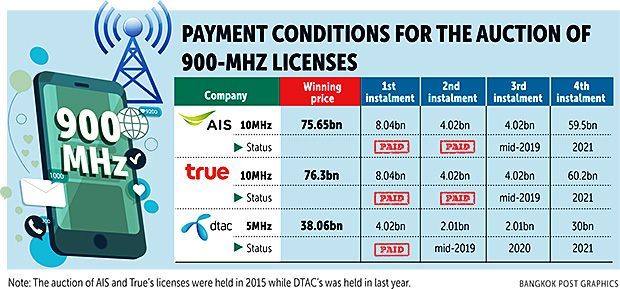
The National Council for Peace and Order (NCPO) is weighing whether to invoke Section 44 to assist the country's top three mobile operators by delaying the final payments on their bidding fees for the 900-megahertz spectrum auction.
NCPO spokesman Col Winthai Suwaree said a meeting Tuesday, chaired by Gen Prayut Chan-o-cha, considered using the authority of the NCPO to invoke the special executive power based on a proposal by the National Broadcasting and Telecommunications Commission (NBTC).
Col Winthai declined to provide more details.
Previously, Deputy Prime Minister Wissanu Krea-ngam said the government considered a solution to help mobile operators either by invoking Section 44 or by issuing another measure.
The three mobile operators -- Advanced Info Service (AIS), Total Access Communication (DTAC) and True Move -- have been lobbying the government to delay the payments, which are scheduled for 2020.
Takorn Tantasith, secretary-general of the NBTC, said the mobile operators told the government that if the payments are not delayed, they would not have enough capital to bid in the 5G spectrum auctions.
"They reported that their investments in 3G and 4G technology have yet to reach break-even point, whereas they have already used all bank loans," Mr Takorn said.
"They would not have any capital left to invest in 5G, which is expected to cost 100 billion baht each, excluding 100 billion baht in bidding fees."
He said the government should make a decision before the general election on March 24.

Mr Takorn earlier said if Thailand was unable to invest in 5G by 2020, it may lag behind neighbouring countries, which could have a drastic impact on Thailand's industrial development, especially AI, the Internet of Things, smart cities and smart farming.
He said Thailand already lagged behind other countries by a decade because of the delay in 3G investments, and eight years due to late 4G investment.
Unless the major operators receive this assistance, the nation's 5G roadmap will be thrown into jeopardy and the chronic problems associated with digital TV operators will not be properly addressed," Mr Takorn said.
The NBTC is on the verge of conducting auctions on several spectrum ranges this year, as planned by the telecom regulator. Any spanners in the works could directly effect digital TV operators.
Money from the auctions is planned to partly be used to subsidise the operating costs of digital TV operators under a long-term survival plan, especially the 700MHz and 2600MHz auctions this year.
Mr Takorn said if Section 44 is invoked, the state would still get reasonable interest rates from the three companies through the 900-MHz licence payment installments. Meanwhile, the state would get money from the planned auctions of several spectrum ranges serving 5G adoption.
Supinya Klangnarong, a former member of the NBTC, disagreed with the regime's efforts to invoke Section 44 to assist the three operators.
"If you are genuine, you should use normal laws and take responsibility for the power you have used, like others," Ms Supinya posted on her Facebook page.
She indicated she was disappointed with the NBTC, which has taken flak for providing excessive assistance to the private mobile operators.
She said if the three operators lack the funds to join the spectrum bidding, the international norm would be to call for new players to participate in line with the principle of a free and fair bid.
"There is no need to have only these three operators forever," Ms Supinya said.